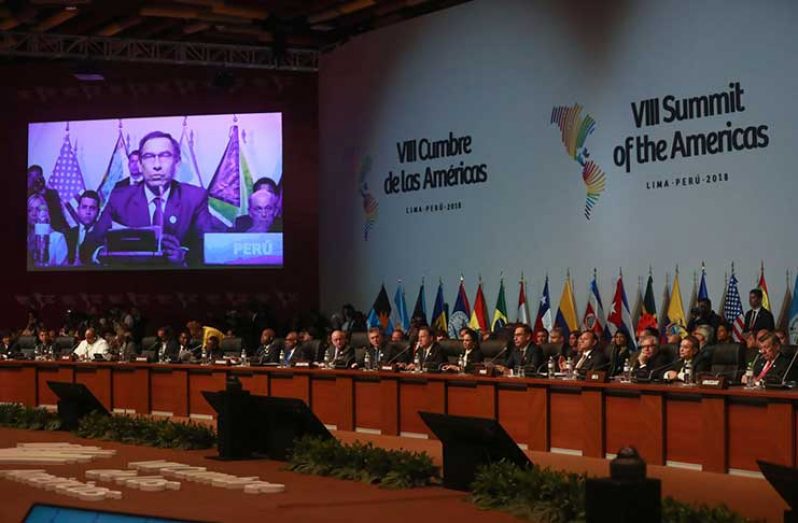By Rabindra Rooplall in Lima, Peru
PRESIDENTS and heads of government at the VIII Summit of the Americas have committed to tackle corruption through stronger regional cooperation and strengthening of their institutions.
During his participation at the plenary session, Peruvian President Martin Vizcarra requested attendees to express their firm will to fight corruption by adopting the Lima Commitment.
In this regard, President Vizcarra called on the leaders to approve the document by acclamation, to which dignitaries responded positively.
Under the theme, “Democratic Governance Against Corruption,” the commitment underscored the prevention of and fight against corruption being fundamental to strengthening democracy and the rule of law in the various states.
Furthermore, the Peruvian leader acknowledged the delegations’ participation in the drawing up of the aforementioned document.
According to the Lima Commitment, corruption weakens democratic governance and citizens’ trust in institutions, in addition to having a negative impact on the effective enjoyment of human rights and the sustainable development of the peoples of the hemisphere, as well as other regions of the world.
The group also reaffirmed the 2030 Agenda for Sustainable Development and firm support for its implementation.
The Commitment also stated that countries must strengthen their judicial autonomy and independence and promote respect for the rule of law and access to justice, as well as to promote and encourage policies of integrity and transparency in the judicial system.
Further, the Commitment noted that it is important to develop a culture of citizen participation and prevention of corruption with a view to strengthening democratic and civic values from early childhood and throughout life, by implementing, teaching and learning programmes at all levels of education, as well as ongoing education programmes.
The document called for ensuring transparency and equal opportunities in the selection processes of public officials, based on objective criteria such as merit, fairness, and aptitude.
In addition, officials should promote the adoption of measures to prevent conflicts of interest, as well as the public filing of financial disclosure statements by public officials, as appropriate.
Further, the document noted that codes of conduct for public and private officials are paramount, as such persons should have high standards of ethics, honesty, integrity, and transparency.
The Commitment further encouraged the effective participation of the private sector in public policies to prevent and combat corruption, while urging public and private enterprises to develop or implement integrity-promotion programmes and training programmes at all levels.
Governments were advised to consolidate the autonomy and independence of high-level oversight bodies, while implementing and strengthening bodies responsible for transparency and access to public information, based on applicable international best practices.
The document stated that it is also important to promote the use of new technologies that facilitate digital government in order to promote transparency, interaction with citizens and accountability, through development of tools for the identification, detection, systematisation, and monitoring of government procedures.
The Lima Commitment also stated that adopting a legal framework for holding legal entities accountable for acts of corruption, including domestic and international bribery, must be consistent with the United Nations Convention against Corruption and the Inter-American Convention against Corruption, when such a framework does not already exist under domestic law.
It was also recommended that financial institutions and financial oversight bodies cooperate to assist agencies responsible for the investigation and prosecution of acts of corruption, to provide a prompt, effective response in international investigations and asset recovery.
The Commitment also underscored the need for effective measures against tax evasion to prevent money laundering, and the illicit financial flows derived from corruption; as well as measures to identify beneficial ownership.
The summit called upon the Joint Summit Working Group (JSWG) to support the implementation and strengthening of national human rights-based programmes to develop the capacity of the police, public prosecutors’ offices, the judiciary, and domestic oversight agencies to combat acts of corruption, including those related to drug trafficking, trafficking in persons, trafficking in firearms and other weapons and the smuggling of goods and wildlife.





.jpg)








